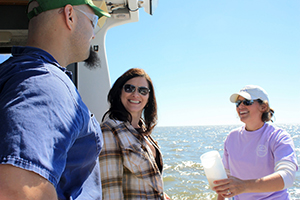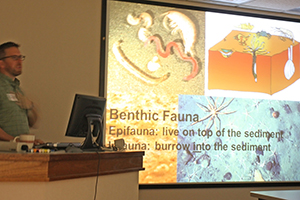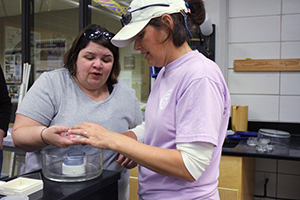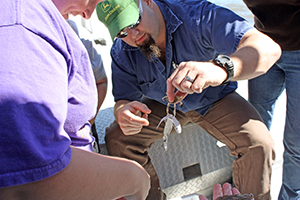
On board the R/V Acadiana, Dr. Tara Duffy and workshop participants collect marine and water samples in marsh waters. (Photo credit: Jessica Hernandez)
An old philosophical question asks, “If a tree falls in a forest and no one is around to hear it, does it make a sound?”
Similarly, if a scientist makes an important discovery and people do not hear about it, will it matter? Scientists are conducting research about oil and other impacts on coastal marine environments. Sharing this unfolding science with communities most affected by the Deepwater Horizon oil spill is a priority for them.
Marine educator Jessica Hernandez with the Coastal Waters Consortium (CWC) voiced the importance of this outreach, saying, “What is scientific research if we cannot share it with the public?” To do this, educators and scientists with the CWC have established a series of public education workshops to highlight recent research about the chemical evolution, biological degradation, and environmental stresses of petroleum and dispersant in the Gulf of Mexico and their effects on coastal and shelf ecosystems.

Dr. Chuck Wall presents research on marine life that live in marsh sediment. (Photo credit: Jessica Hernandez)
Dr. Chuck Wall and Dr. Tara Duffy, postdoctoral research associates with the Louisiana Universities Marine Consortium (LUMCON), led the first Gulf Lagniappe Public Education Workshop on October 26, 2013 at the DeFelice Marine Center in Cocodrie, Louisiana. Attendees listened to presentations, explored the bay, used laboratory equipment, and—in true Louisiana fashion—enjoyed a delicious chicken and sausage gumbo lunch.
Dr. Wall focused on two research areas—the hypoxic or “dead zone” in the Gulf and the effect of oil on the tiny creatures that live in salt marsh mud. He talked about the abundance and diversity of these mud-dwelling critters and explained his work that uses samples from both oiled and non-oiled areas to understand how oil exposure affects them.

Dr. Tara Duffy helps participants use laboratory equipment to study marine larvae. Photo credit: (Jessica Hernandez)
A fisheries expert, Dr. Duffy spoke about her work with the early life stages of blue crab, anchovy, red snapper, and trout to study the impacts of oil exposure on these animals at this delicate developmental stage. She described lab experiments that exposes larvae to oil and records how the organisms respond.
After the presentations, participants traveled by boat around the local estuary and used trawl nets to collect marine samples. They experienced the biodiversity – both plants and animals – that live right offshore and that are at risk. After the bay tour, the group looked at plankton specimens under a microscope. Viewing these tiny organisms, integral to the Gulf of Mexico’s food web, brought home the many lessons of the day on the interconnectedness of the environment.

On board the R/V Acadiana, workshop participants identify marine animals caught when trawling in marsh estuaries. (Photo credit: Jessica Hernandez)
One attendee explained the desire to continue learning about the research saying, “Unless you are in this career, the aspects of this life and the ecosystems all around us are never in your mind,” adding that it was important to know “the things we do that impact them and how they impact us.”
The CWC will host another all-day Gulf Lagniappe Public Education Workshop on Coastal Wetlands Formation, Functions, and Susceptibility on November 23 at the LUMCON facility in Chauvin, Louisiana. For more information, go to the CWC website. To register directly online, go to http://blogcwc.weebly.com/events.html.
This research was made possible in part by a grant from BP/The Gulf of Mexico Research Initiative (GoMRI) to the Coastal Waters Consortium. The GoMRI is a 10-year, $500 million independent research program established by an agreement between BP and the Gulf of Mexico Alliance to study the effects of the Deepwater Horizon incident and the potential associated impact of this and similar incidents on the environment and public health.
